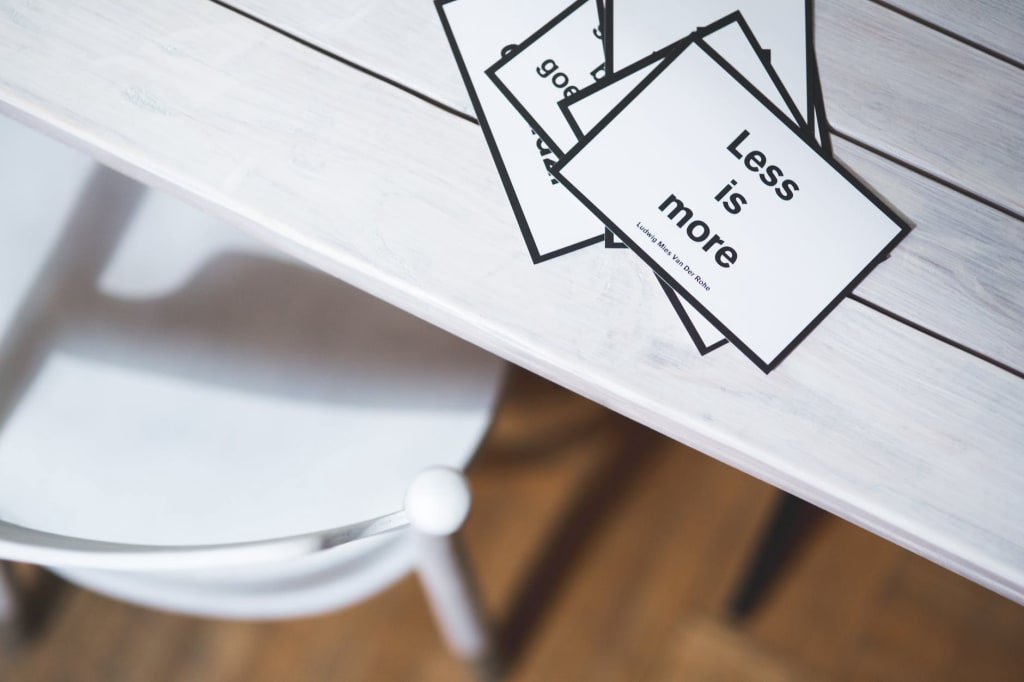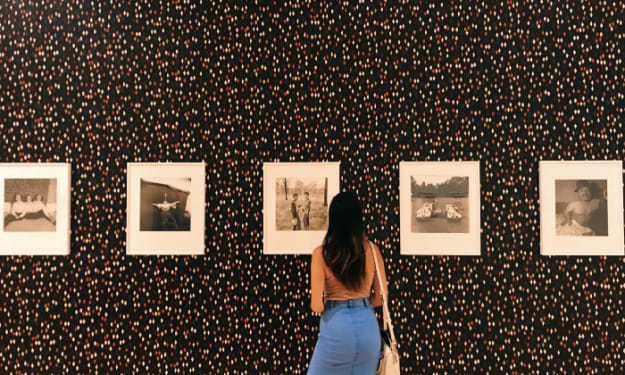Minimalist life helps me engage in creative work
The simple life experience of an advertiser

Always fascinated by "organization and storage" and constantly absorb relevant knowledge. In the past year, I came into contact with the concept of "Minimalism", which seems to be slowly becoming popular. All the benefits.
Minimalism keeps people awake and really focused on every moment
The core spirit of minimalism is "only have the least and really need things". After establishing this basic understanding, I spent more than half a year to carry out personal "disappearance" one after another. After screening, I left something I like very much and really more effective.
I can appreciate it, but I don't have to have it.
The above wise quotation comes from my favorite book among relevant books - "the practice of simple life". I recommend it to anyone interested in the concept of minimalism.
Harvest 1. Material level
In the process of moving towards minimalism, the first harvest is of course the material level. I'm not a complete minimalist. I used to know how to shop and how to see what I like to see, but I was really restrained from material desires and felt more clearly, because there were fewer things to take care of. There will be more time and energy to focus on various "experiences" in life.
This is a very beautiful change for me in the advertising industry.
Contact a lot of business information every day to maintain a keen perception of business trends and market conditions; Tasks such as daily copywriting and marketing activities should be forced to digest before leaving a deep impression on consumers. Go deep into the play and find out how unique and wonderful various products are, and then have a gorgeous performance to tell the target audience how indispensable these things are to them with a lifetime of love.
After implementing minimalism, I found that when my private life was deliberately kept simple, my work also had some unexpected help.
First of all, after leaving, the head previously set as "condition a needs to buy a, condition B needs B" (or it can be said that this is actually an occupational injury, which is not enough practice for beginners?) follows the principle of minimalism. In some cases, I know that those things are really convenient, but my first thought is: "how to make full use of each existing project?"
This is a good training for the so-called "creative thinking".
Harvest II. Knowledge management level
As mentioned in the previous (next) article, I had a very important insight and attempt last year, that is, to "establish my own learning system" and "consciously and continuously practice output".
After deciding to live a minimalist life, it also had some impact on my way of knowledge management. Here are the main points I want to share in this article.
Minimalism practice "concentrated thinking" and "divergent thinking"
I once read an article on the Internet, using the words "concentrated thinking" and "divergent thinking" to discuss the information processing mode of the brain. I think it is very clear and easy to understand. I will continue to use it to share my current knowledge management practices.
Let's introduce these two nouns first:
"Focused thinking" means that when our brain receives information, it will immediately process it for focused thinking. For example, dealing with professional problems at work, reading a very logical book, or learning a new subject, all need to use centralized thinking.
The relative "divergent thinking" is "extraordinary thinking outside the routine". I interpret it as: Based on past experience and established knowledge, "flash of inspiration" establishes new connections. This way of thinking does not seek to solve the immediate problems. Its purpose is to stimulate our "creativity", that is, the "creativity" recognized by ordinary people intuitively.
Identify "current meaningful things" in a large amount of information every day (whether passive or active).
"Browse" is not equal to "Internalization", and "busy" is not equal to "output value".
My current "input" principle is "simple and rough". When my brain receives a message and quickly judges that it is "worth" or "should" to be processed immediately, I begin to "focus on thinking" and focus on the core concept of each message, so as to "return to the underlying law" to organize it
This method is mainly inspired by the book precision learning. I strongly recommend reading this book all over the world. I won't say much here. Let's focus on my practical experience~
The theoretical contents and examples cited in most books or online articles (except Literature) on the market are actually very repetitive. While accumulating a lot of words, what I have done is not only "browsing knowledge" itself, but also constantly confirm to myself through deeper "dialogue": is this knowledge I have never touched? If not, which bottom conventional packaging is this? Is there any new inspiration for me? Then write down every experience in my learning action notes (the digital note taking software I use is impression notes) and update it constantly.
My previous mistake was that when I saw some "Wow, this is so rewarding" content, I would directly extract the whole article and save it in my impression notes. Now I feel so motivated and great. As time goes by, I become more and more guilty. After a while, I looked back and read the golden rules I had saved before. I am still very moved and ashamed. Why am I still not making progress.
Back to minimalism. Now I use the principle of minimalist management, because there is less material accumulated and there is no pressure in retrospect. I can repeatedly confirm whether what I digest is helpful to me, "I can move forward now" and truly realize "phased" improvement.
Focus on "what's left" and its "value to me", that is, "what kind of action will this news affect me", or more practical "how to help me complete the output I need now".
According to the "immediate, simple and rude" processing steps, when you see an article that you are interested in or may be helpful to a project, the first thing is not to save and talk about it, but to "read immediately" and immediately retrieve the "useful" part of "for me", and write it into the study notes together with my current ideas.
When you see this, you may think, "but won't your mind be interrupted all the time? It seems to be busy all the time?" but in fact, my experience is that this is a kind of training that can keep the mind running at a high level, Continuously strengthen their thinking and induction ability and reduce the cognitive conversion cost of "re entering one project at a time". Instead, there can be more efficient output.
This approach is in line with the nature of creative work.
When I was practicing my thinking ability of "concentrated thinking", I had more room for maneuver because of the minimalist management, and also kept my mental ability of "divergent thinking". Reflected in my work, when I write a copy and think about ideas, I can maintain a certain output rate and constantly give the brain the stimulation needed for creative thinking.
I found that this is actually the same as my minimalist management of material life. When dealing with all kinds of tangible objects, I need a more regular set of rules, and then more intangible spiritual efforts, which is the same truth.
In short, the two major things that minimalism has helped me in my creation are:
Alleviate knowledge anxiety
Ease the pressure of "want to be creative"
Further exploration, behind these benefits, there is actually a common key: "minimalist life helps me build self-confidence."
The implementation of minimalism has indeed helped me gradually develop a positive self-awareness - my selection vision and critical ability to filter / interpret information, as well as my own behavior have been significantly improved. "Know what I'm doing and have confidence in why.
The so-called creativity is just the accumulation in daily life
In the era of fragmentation, actions are broken. By practicing the minimalist management of "focusing on thinking", you can continuously accumulate every fragmented action. Under the set big goal line, you can promote your achievements bit by bit and enjoy "divergence". Every daily routine handled by "thinking".
Life is the most important word
After trying to live a minimalist life, I firmly believe that the most important job of creative work is to live a good life.
Live by heart, get along well with others, experience all the experiences and face the problems we face together. Therefore, in order to solve this problem, we try to find ideas. Only in this way can we have the opportunity to really solve the problem. Therefore, I hope that what I can convey through my advertising works has always been "value to the brand", not just products with high homogeneity.
Finally, I end with two favorite words of praise to my predecessors.
If creativity is just a small light spot and you have a big warehouse, you just open the door every time, grab some and pick them out to see if the catch is bright and good enough. You must believe this and hypnotize yourself.
The next time someone tells you that you have no creativity, you don't have to be afraid. Everyone has no creativity. We are just people who go to the warehouse to get things. As long as we don't stop, we will find things, and we will find something to create the world. Impressive things. -- Lu Jianzhang
A simple life will enrich your warehouse.
"How you feel, accumulate, remember yourself, where you grew up, what you have experienced, how many times you have been in love, the books you have read, the movies you have seen, and the photos you remember are unique. They will connect together and lead you to make unique things. So in the end, you must find the answer from yourself." - Gong Dazhong
That's why I've always been fascinated by creative work.





Comments
There are no comments for this story
Be the first to respond and start the conversation.